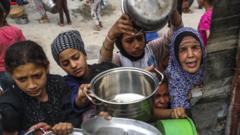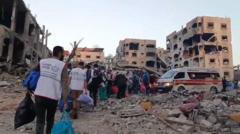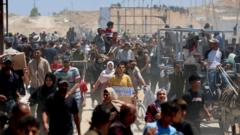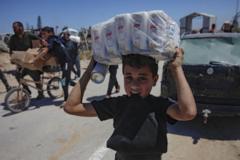The situation in Gaza has escalated dramatically, prompting serious concerns regarding humanitarian conditions and the dire need for food assistance.
Gaza Sees Desperate Food Warehouse Break-In Amid Humanitarian Crisis
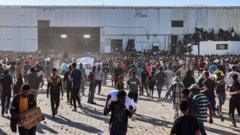
Gaza Sees Desperate Food Warehouse Break-In Amid Humanitarian Crisis
UN's World Food Programme reports chaotic scene of hunger-fueled desperation as crowds breach aid warehouse.
The United Nations' World Food Programme (WFP) reports that a chaotic scene unfolded in central Gaza as throngs of desperate individuals broke into a food warehouse in Deir Al-Balah. The incident resulted in the deaths of two individuals and injuries to multiple others. Footage released by AFP depicts crowds forcefully entering the Al-Ghafari warehouse, seizing bags of flour and food as gunfire echoed in the background, although the source of the gunfire remains uncertain.
The WFP has issued stark warnings that humanitarian needs in Gaza have "spiraled out of control" following an Israeli blockade that lasted nearly three months, which was only recently eased. Essential food supplies were stored at the warehouse for planned distribution, and the WFP emphasized the urgent requirement for an immediate increase in food assistance to alleviate the suffering of people fearing starvation.
In its statement, the WFP highlighted the concerning deterioration of conditions in Gaza, stressing the importance of not restricting humanitarian aid to the large number of hungry citizens. Israeli authorities announced that 121 trucks filled with humanitarian aid, including food and flour, were allowed to enter Gaza as of Wednesday, marking a shift towards limited aid flow after weeks of restriction.
The Gaza Humanitarian Foundation (GHF), a controversial organization backed by the US and Israeli governments, has recently commenced operations as an alternative aid distribution system. Employing US security contractors, the GHF overlooks traditional UN assistance methods, leading to accusations from the United Nations about its impractical and unethical structure. Israeli and US officials argue that this approach prevents aid from being abused by Hamas, which the organization has denied.
On Tuesday, 47 individuals sustained injuries when crowds overwhelmed a GHF aid distribution center in Rafah, merely a day after it became operational. A senior UN representative reported instances of looting from UN aid trucks, highlighting the chaotic landscape as desperate crowds seek resources.
Jonathan Whittall, the head of the UN's humanitarian office for the occupied Palestinian territories, revealed that there is no evidence indicating that Hamas is misappropriating aid through viable humanitarian channels. He further noted that the real loss of relief goods has stemmed from criminal gangs allegedly permitted by the Israeli army to operate near the Kerem Shalom crossing point.
The UN contends that a significant increase in aid, reminiscent of the recent ceasefire period between Israeli forces and Hamas, would minimize the risk of looting and enhance the effectiveness of its established distribution networks across Gaza. This pressing situation unfolds against the backdrop of European Union statements criticizing Israeli airstrikes in Gaza as excessive in the pursuit of combating Hamas, alongside reports of casualties and injuries amid the ongoing conflict.


